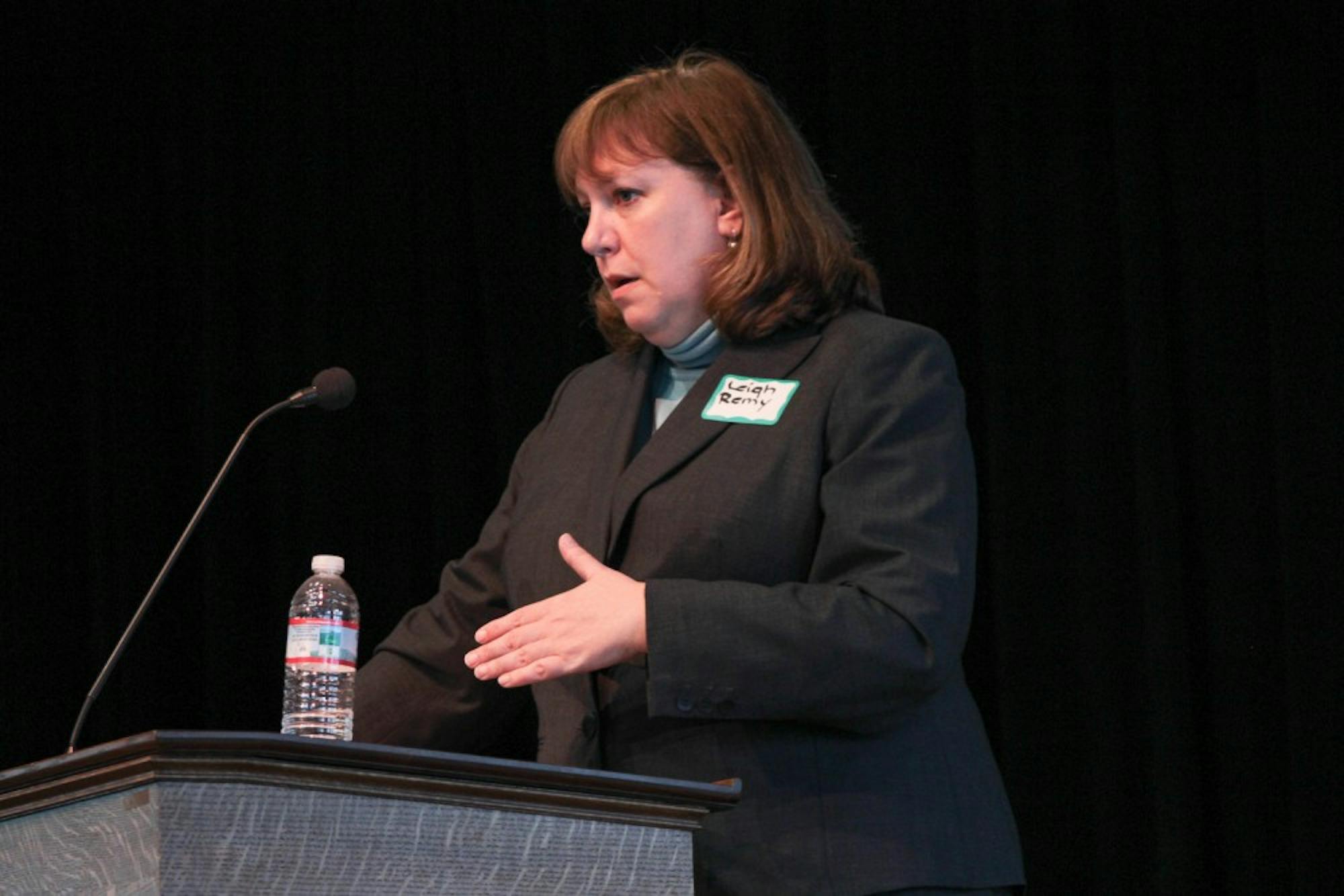The third annual Symposium on Sexual Assault, held Friday afternoon, highlighted the College’s recently proposed sexual assault policy, the Center for Community Action and Prevention and student research on sexual assault. The event was hosted by the Student and Presidential Committee on Sexual Assault and guides the group’s annual recommendations.
Around 150 people attended the three-hour symposium, a significantly higher turnout than that of previous years, SPCSA chair Sophia Pedlow ’15 said.
“There were lots of new voices in the room this year,and I think that’s indicativeof the shiftingawareness on our campus.” Pedlow said. “Events of the last year have made students more aware than ever thatsexual violence is a problem, while also really showing thatwe all have a role in addressing it.”
Judicial Affairs director Leigh Remy spoke about the details of the policy proposal — including the processes of reporting, investigation and adjudication — and said it is on track to be implemented this summer. The proposal, released March 14, would set a “strong presumption” that any sexual assault would result in expulsion, regardless of intent, means or a perpetrator’s prior violations.
Remy said that while the policy clearly defines consent, the judicial process would differ in individual cases. For example, Remy said, the punishment for online retaliation via sites such as Bored at Baker would be determined on a case-by-case basis.
Remy also stressed the importance of enhancing prevention techniques.
“By the time it hits our office, it’s too late,” she said. “The harm has been done.”
The College will accept comments on or suggestions to the policy until April 14.
Dean of the College Charlotte Johnson discussed the new Center for Community Action and Prevention. The center will work with groups like the Sexual Assault Awareness Program and the Center for Gender and Student Engagement to mobilize community members around prevention and accountability, she said.
She added that the SPCSA was influential in the creation of both the proposed sexual assault policy and the Dartmouth Bystander Initiative.
Safety and Security director Harry Kinne, who attended the event, said he hopes CCAP will spark conversation across campus, helping to more effectively determine ways to prevent sexual assault and support survivors.
Findings by the winter term recipients of the SPCSA’s two Elizabeth A. Hoffman grants, which provide support and money to students researching sexual violence prevention, were presented to the room.
Bridget Lynn ’15 used her grant to investigate student awareness of sexual assault resources at the College, specifically those available through SAAP and the sexual abuse peer advisors program.
She said that 69.1 percent of dozens of students surveyed said that they did not have a thorough understanding of the resources SAAP offers. Lynn proposed included placing more trained peer advisors in residence halls, increasing advertising for the SAAP office and stabilizing the program by reducing the high rate of staff turnover and the changes in the office’s physical location.
Luke Katler ’15, who attended the event, agreed with Lynn’s proposal to include sexual assault resource information in bathroom stall publications such as the Stall Street Journal, which is widely read, he said. Katler is a member of The Dartmouth staff.
Holli Weed ’14 presented on behalf of grant recipient Silvia Arora ’16, who is not on campus this term. Arora’s research examined the sexual assault adjudication process at peer institutions, including other Ivy League universities and small liberal arts colleges.
Arora found that of the around a dozen institutions she looked at, none had a zero-tolerance policy.
Her findings also showed that students would prefer a shorter process that is less distressing for the reporter. Many victims who chose to go through the adjudication process said that they would prefer to not have to retell their account of the assault, she found. She suggested that the College use a process that would require complainants to tell their account only once.
At the end of the session, College President Phil Hanlon took questions.
“We’ll get our best thinking and ideas from gatherings like these,” he said.
Eliminating sexual assault and gender-based violence, he said, has been one of his highest priorities as president.
One attendee asked what Hanlon planned to do to prevent sexual assault as an individual, beyond his duties as president and alumnus.
“Over the last 10 months I’ve met with, it turns out, 2,400 students in smaller groups,” he responded. “In virtually every one of those settings I’ve pressed this priority.”
Hanlon committed to answering the remaining questions in writing.
Pedlow said Hanlon’s responses will be shared publicly on the SPCSA website.
Throughout the symposium, community members were encouraged to discuss possible suggestions through breakout discussion sections.
Discussing sexual assault with community members other than undergraduates was a highlight of the symposium, said Soohyung Hur ’17, who cited the diversity of attendees as one of the reasons she decided to attend.




